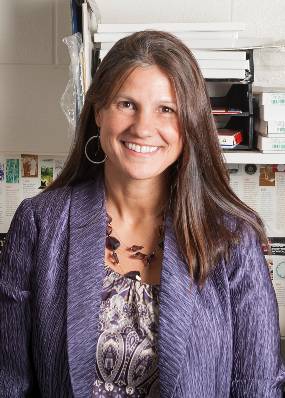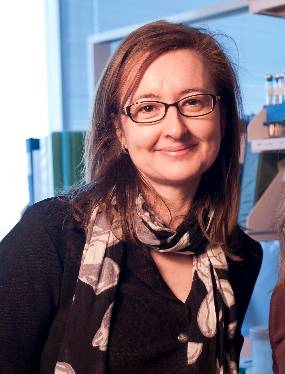NatSci researchers receive prestigious American Society for Microbiology awards
Article Highlights
- Michigan State University College of Natural Science microbiologists, Shannon Manning and Gemma Reguera, are 2024 recipients of prestigious awards from the American Society for Microbiology.
- These awards are given annually to nominees who have contributed significantly to advancing their careers, institutions and the study of microbiology.
- With 35,000 members, American Society for Microbiology is the oldest and largest single life science membership organization in the world.
Two Michigan State University College of Natural Science (NatSci) microbiologists, Shannon Manning and Gemma Reguera, are 2024 recipients of prestigious awards from the American Society for Microbiology (ASM). They are among 17 faculty members who received ASM awards nationally.
Manning, an MSU Research Foundation Professor in the Department of Microbiology and Molecular Genetics (MMG) was awarded the Alice C. Evans Award for Advancement of Women. Reguera, MMG professor and NatSci associate dean of faculty development and affairs, received the D.C. White Award for Interdisciplinary Research.
The awards are given annually to nominees who have contributed significantly to advancing their careers, institutions and the study of microbiology. At MSU, the MMG awards committee led by Professor Cindy Arvidson created and submitted the nominations. Awardees were then chosen by an ASM selection committee.
“At MSU, we know well how Shannon and Gemma contribute every day to our excellence,” said Victor DiRita, Rudolph Hugh Endowed Chair in Microbial Pathogenesis and MMG department chair. “National awards such as these are very competitive and make it clear that others outside of MSU also recognize their talent and contributions.”

Shannon Manning, MSU Research Foundation Professor, Department of Microbiology and Molecular Genetics. Credit: Kurt Stepnitz
Created in 1983, the Alice C. Evans Award for Advancement of Women honors those who have worked successfully toward full inclusion and forward progression of women in microbiology. They must also be mentors and advocates committed to helping other women succeed. Alice Evans became the first woman President of the Society of American Bacteriologists, later branded the ASM, in 1928. She discovered the bacteria that causes brucellosis in humans and cattle which led to the introduction of milk pasteurization in 1930 in the United States.
“It is such an incredible honor to see my name listed along with so many extraordinary women scientists including Alice Evans, Rita Colwell, and Gemma Reguera,” said Manning, who is also an MSU AgBioResearch faculty member. “I consider myself lucky in that I have been surrounded and supported by many remarkable women who served as excellent role models throughout my career and life. Their belief in me always gave me strength. Because women in science face unique challenges, I think it’s important to recognize the challenges and create the most supportive environment that promotes growth.”
“Shannon has demonstrated a deep commitment to training and supporting women in science throughout her career at Michigan State,” DiRita said. “She is an exemplary colleague in all regards, and trainees flock to her lab because they will do great science and be trained with attention to their distinct and unique needs. It is wonderful for women in her group to have a role model and mentor of her dedication and caliber.”
Two years after receiving the Alice C. Evans Award, Gemma Reguera has now been tapped for the D.C. White Award for Interdisciplinary Research.

D.C. White was a distinguished role model for interdisciplinary microbial research and an inspirational mentor to others. He is known for bridging the gap between many different fields which he demonstrated by publishing articles in more than 100 different peer-reviewed journals. Awardees must be both outstanding mentors and interdisciplinary collaborators.
“I am thankful to my colleagues at MMG for the nomination and to colleagues outside MSU who supported it,” Reguera said. “This award feels even more special when you consider that I am the third woman to receive this honor since its establishment in 2008, and the first woman to receive it since 2011. I hope it does not take so many years to recognize the important roles that women play in mentoring the next generations of interdisciplinary scientists.”
As a professor, Reguera knows how foundational mentorship is to scientific scholarship. When she was a postdoc, she met D.C. White and admired how supportive he was of his mentees. Like White, Reguera also values interdisciplinary research for how it affords opportunities to advance science in new, creative directions.
“One of the great features of microbiology at MSU is its highly interdisciplinary nature,” DiRita said. “Gemma personifies interdisciplinary research, which is why the D.C. White award is the perfect recognition. Whether she is using microbes to generate electricity or to develop sustainable building materials, Gemma continually conquers new frontiers through her highly collaborative, intensely creative nature.”
In addition to the $1,400 cash prize and a commemorative keepsake, each awardee is invited to be recognized and give a talk at the June ASM 2024 Microbe meeting in Atlanta, Georgia.
With 35,000 members, ASM is is the oldest and largest single life science membership organization in the world.Banner image: Two images side by side – (Left side) A graphic illustration of electric microbes that produce protein nanowires to mineralize uranium and other toxic metals and to grow communities on electrodes that harvest current from organic wastes (Reguera research). Credit: Karl Gude; (Right side) The circle plate with pink and white colonies represents a population of Gram-negative bacterial cells growing on MacConkey agar, which is used to detect E. coli (Manning research). Credit: Rebekah E. Sloup